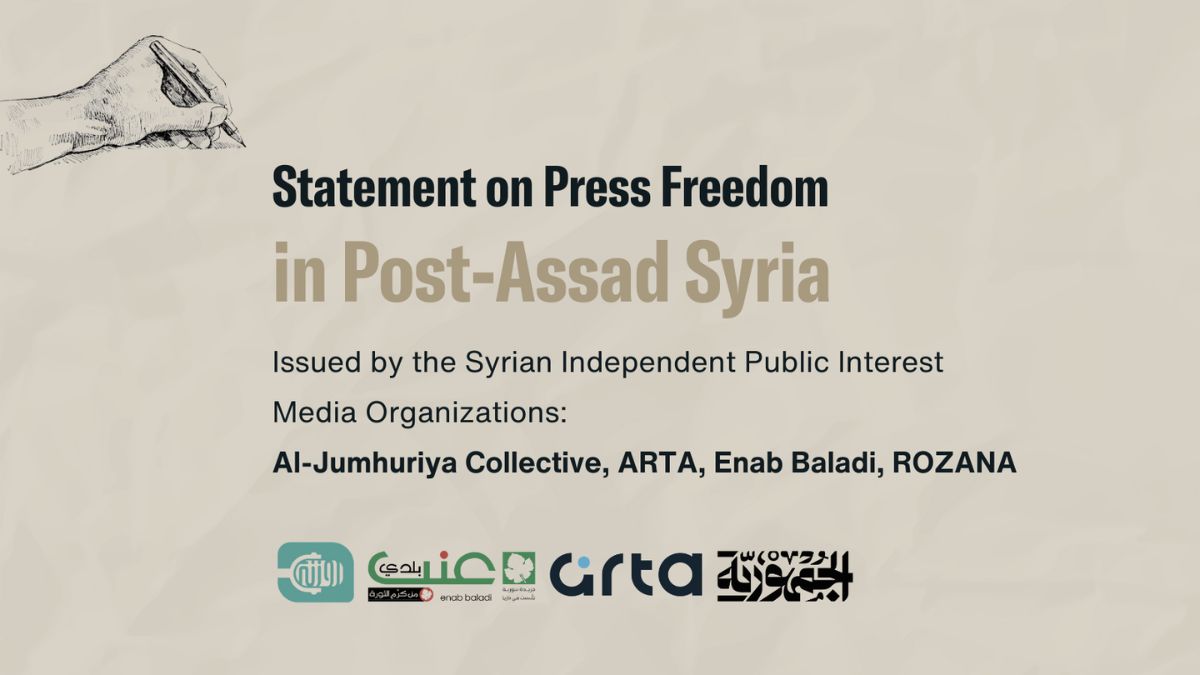
Statement on Press Freedom in Post-Assad Syria

Preamble
For more than five decades, the Assad regime waged a campaign of unparalleled brutality to annihilate press freedom, wielding terror as a weapon to silence dissent and extinguish the voices of those who dared to report the truth. Journalists and media practitioners were hunted and subjected to torture, enforced disappearances, imprisonment, and exile, while their families were harassed, extorted, and terrorized.
Against this backdrop, the 2011 Syrian revolution gave rise to a burgeoning, independent media sector which, at great personal sacrifice to those with the courage to work in it, shattered the wall of silence the regime had built over decades. Faced with unrelenting violence and widespread disinformation campaigns to distort and delegitimize voices critical of the Assad regime and all abusers of power, independent journalists sought to facilitate the free exchange of information. They gathered narratives and verified facts pertaining to peaceful protests, civic activities, and self-governance efforts. As well as documenting armed confrontations, atrocities, and war crimes, they gave context to rapidly unfolding events and made the evidence and sources they had gathered publicly available and accessible. They endeavored to hold accountable the perpetrators of crimes for their words and actions while simultaneously amplifying previously unheard voices. They did this to capture the breadth of human experience in all its harrowing bleakness and profound beauty – and in so doing, they became the chroniclers of a nation’s pain, and of a nation’s resilience.
For those who dared to pursue it, these efforts to seek the truth and share it came at an unthinkable cost. Since the revolution began, the Syrian Journalists Association, the Syrian Center for Media and Freedom of Expression, and others, have documented thousands of violations against journalists, media practitioners, and media organizations by state military and security agencies. Reporters Without Borders have documented the deaths of 283 journalists killed in connection with their work, 161 of them by the Assad regime and dozens more by other forces seeking to suppress the truth. Countless reporters have been maimed, exiled, or silenced, and entire families have been shattered by relentless persecution. Undeterred by these devastating losses, Syria’s independent media has remained steadfast in its resolve to uncover the truth and hold accountable any party that stands in opposition to this mission.
The toppling of the Assad regime on 8 December 2024 marked a pivotal moment in Syria’s history, borne of the unwavering courage and sacrifice of its people. At the forefront of documenting this historic turning point was Syria’s independent media.
In the course of its work over the past 13 years, this sector has evolved by providing individuals with the skills and competencies necessary to make the transition from citizen narrators to professional journalists. On the foundation they have laid, these journalists and media practitioners will continue to determine a future where truth can never again be suppressed and where no regime dominates the narrative of this nation. Syria’s independent media stands as both a symbol and legacy of the revolution’s enduring struggle for dignity, justice, and freedom.
Demands For Press Freedom
The undersigned Syrian Independent Media organizations affirm their belief that a dictatorship is defined as such by both its actions and inactions, not merely by who is at its helm. Commensurately, and pursuant to our belief in the fundamental and unarguable need for a free press, we call for safeguarding the free press in nascent formal and informal institutions in a post-Assad Syria.
A truly free media requires:
- Justice and Accountability: All perpetrators of crimes against journalists and media practitioners must face trial, including those responsible for enforced disappearances, torture, and extrajudicial killings. All detained journalists and media practitioners must be released, and impunity for attacks on media workers cannot be tolerated.
- Abolition of the Ministry of Information, and the elimination of all forms of censorship over the media. An independent regulatory body must be established through a participatory process which includes Syrian Media Organizations, Civil Society Organizations concerned with Freedom of Expression and Media, independent journalists, and media practitioners, under the guidance of local and international experts, to permanently sever executive authority from media oversight.
- Legal Protections for Freedom of Speech and of the Press: Freedom of the press is inextricably linked to freedom of speech. Laws that run contrary to either must be immediately repealed, including Law No. 20 of 2022 (the cybercrime law), Law No. 19 of 2012 (the counter-terrorism law), and the most recent media draft law of 2024, all of which grossly manipulated legal principles in the service of silencing dissent. Modern legislation must be developed which aligns with international standards and principles of international law, ensuring the comprehensive organization and safeguarding of rights and freedoms, that foster a secure and enabling environment for media work. In place of such laws, there must be a legal framework to ensure a central tenet of the Universal Declaration of Human Rights: “Everyone has the right to freedom of opinion and expression; this right includes freedom to hold opinions without interference and to seek, receive, and impart information and ideas through any media regardless of frontiers.” Journalists must be free to pursue and publish the truth without fear of persecution and must be free from both state and non-state coercion, censorship, and undue influence. Safeguards must be installed to prohibit the state from compelling journalists to reveal their sources and to ensure the ability of journalists to hold the government accountable in a way that does no harm to those aiding in this effort, including the journalists themselves.
- Constitutional Guarantees: To incorporate, unequivocally and irreversibly, media rights and freedoms guaranteed under international human rights law into the constitutional text, explicitly including references to relevant international agreements.
- A Free and Pluralistic Media Landscape: The state must not retain a monopoly over the exchange of information, but rather take all steps necessary to facilitate and give equal access to any and all media organizations and practitioners to attain the proper operational requirements to function.
Urgent Transitional Priorities
Censorship Prohibition: It is strictly prohibited to impose censorship on media outlets or independent journalists, or to confiscate, suspend, or shut them down. Exceptions may only be allowed in narrowly defined and temporary cases that comply with the restrictions outlined in the International Covenant on Civil and Political Rights.
Legal Protections for Opinions and Reporting: A journalist’s or media practitioner’s opinions or factual reporting shall never serve as grounds for legal action. Journalists must not be compelled to disclose their sources.
Safeguarding Journalists’ Rights: Journalists must be protected from violations of their dignity, physical integrity, and moral standing due to their published work. They shall not face prosecution for expressing opinions or disseminating information as part of their professional duties.
Deprivation of Liberty: No punitive deprivation of liberty shall be imposed for publication-related offenses, except in cases involving incitement to violence or hatred, and only with due legal process and recourse.
Protection of Journalistic Materials: Documents, data, and other materials held by journalists must not be used as evidence against them in criminal investigations unless their possession or acquisition constitutes a crime.
Protection Against Unlawful Searches: Journalists must not be searched, detained, or interrogated for their professional activities, except in cases of flagrant crimes. Additionally, their work tools—such as laptops, cameras, and documentation—must remain protected from seizure.
Right to Public Information: Journalists must have guaranteed access to public information, whether legislative, judicial, governmental, or administrative, and must have the freedom to publish such information without restriction.
Equal Access to Information: No barriers shall impede access to or dissemination of information. Equal opportunities must be ensured across all forms of media, including print, electronic, visual, and audio.
Institutional Facilitation: Government bodies and public institutions must establish mechanisms—such as dedicated offices or websites—to facilitate journalists’ access to information.
Source Protection: Journalists’ sources and contributors must be protected. Confidentiality can only be breached under compelling judicial authorization, strictly in cases involving crimes posing significant public safety threats, and only when no alternative means exist to obtain the information.
Free Publishing and Licensing Integrity: Publishing must be free and not subject to prior licensing. Licensing and accreditation processes must be administered by an independent regulatory body, solely for the purpose of safeguarding the integrity of the profession and ensuring the safety of its practitioners. Licensing must not be misused as a bureaucratic loophole to restrict press freedom.
Abolish Language Restrictions: Immediately repeal and abolish all language restrictions in media regulations, which were used by the Assad regime as a tool to violate the cultural rights of Syria’s diverse ethnicities. These restrictions also obstructed the operations of media outlets and independent journalists working in Kurdish, Syriac, Armenian, and other languages. Eliminating such barriers is essential for fostering an inclusive and dignified media environment.
Ensure Freedom and Safety for Women Journalists: Guarantee the freedom and safety of women journalists and media practitioners to perform their professional duties without fear of harassment, discrimination, or violence. Establish robust legal and institutional mechanisms to address gender-based threats and provide equal opportunities for career advancement within the media sector.
Lift Restrictions on Funding: Remove restrictive measures on foreign and national sources of funding, enabling media organizations to receive grants, donations, and accrue advertisement profits crucial for rebuilding a viable media sector.
Conclusion
The collapse of the Assad regime must not only mark the end of an era steeped in fear and oppression, but it must also serve as the dawn of a new chapter in the country’s history. This chapter must be rooted in freedom, justice, human rights and democracy. Freedom of the press is not merely a cornerstone of democratic society. Rather, it is its beating heart, a lifeline for truth, accountability, and the collective memory of a nation. Without it, democracy falters, and tyranny finds fertile ground.
We the undersigned call upon all de facto and future authorities of Syria to rise to this historic occasion. Let this be the moment where freedom of the press is enshrined as sacrosanct; where the rights of journalists are fiercely protected; and where truth is shielded from silence. May history record this juncture not as a fleeting reprieve but as the birth of a free and democratic Syria.




if you think the article contain wrong information or you have additional details Send Correction
النسخة العربية من المقال
-
Follow us :

















 A
A
A
A
A
A




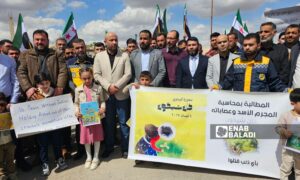
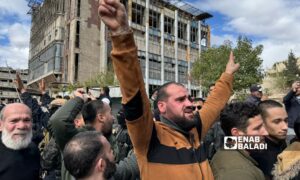
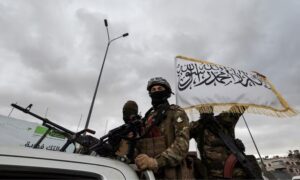
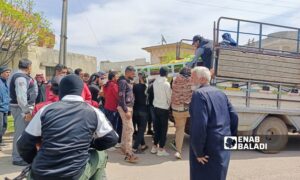
 More Politics
More Politics